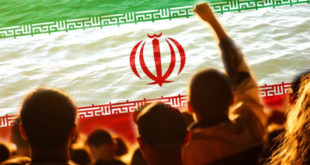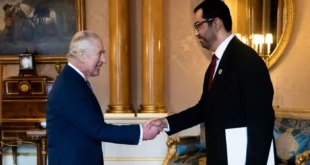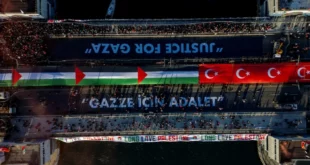
Twenty-five years ago, a peace deal crafted at a United States air base in Ohio ended the Bosnian war. Today, nobody likes it, but in a politically-divided country, agreement on any reform will be tough to reach.
Some want it rewritten, smoothing Bosnia’s path to membership of the European Union. Others want it tweaked to further divvy up power between peoples. Some, most radically, want it rejigged as a route to dissolution.
As the Dayton peace deal that ended the Bosnian war turns 25 in November, few would disagree that the system it bequeathed needs changing. But no one can agree how.
A quarter of a century since the end of a war in which some 100,000 people died, Bosnia’s Bosniaks, Serbs and Croats are worlds apart on how to reform a highly decentralised and complex system of ethnic power-sharing that, critics argue, has kept the country in a permanent state of ethno-political quarrelling and crisis.
“I see it as a peace agreement that’s served its main purpose to end the war but no longer serves an important purpose of governing the citizens of Bosnia and Herzegovina in a way they can be secure and prosper,” said Daniel Serwer, a professor at Johns Hopkins University and former US envoy to Bosnia who attended the peace negotiations at a US air base in Dayton, Ohio, in 1995.
“There have been some moments when that was a little bit less true but basically you’ve seen the war continue by political means,” Serwer told BIRN in a Skype interview.
Hostage to nationalists
To end the 1992-95 war, the negotiators in Dayton split power between two autonomous entities and, within one of these entities, between 10 cantons. Central institutions were left weak, with the presidency a rotating, tripartite arrangement representing the three ‘constituent’ peoples – Bosniaks, Serbs and Croats.
Critics of the setup say that, while it ended the war, Dayton has been exploited by nationalists and must be changed if the country is to function more efficiently and pursue the reforms required of it to integrate with the European Union and NATO and secure the stability and economic progress its citizens crave.
For years, the Party of Democratic Action, SDA, the Croatian Democratic Union, HDZ, and the Alliance of Independent Social Democrats, SNSD, have dominated political life.
The Bosniak SDA and the Croat HDZ have been in power more or less uninterrupted since the first free elections in the then Yugoslav republic 30 years ago, while Serb SNSD under strongman Milorad Dodik picked up the baton from the Serb Democratic Party of Bosnian Serb wartime leader and convicted war criminal Radovan Karadzic.
For a time after the war, Bosnia’s foreign backers cajoled Bosnian leaders into accepting changes to the Dayton setup, such as expanding the powers of the central government at the expense of the two autonomous entities or the creation of a joint armed forces, but those days are long gone and Bosnia has slipped way down the international agenda.
“The internationals have tried repeatedly, they have failed and the international power authority has faded in Bosnia-Herzegovina,” said Serwer.
He argued that the only way to change matters would for Bosnians to vote out the nationalist parties. “I am not hopeful that it would happen at the next election. I know the reality. But that’s what it takes.”
“I don’t actually think it’s possible to bring the parties who are currently in power to change it in a way that would remove them from power. They like this system and it works really well to enrich them.”
US renews call for change
In 2006, a US-backed ‘April package’ of sweeping constitutional reforms came closest to beefing up the central government but, despite enjoying the backing of most main parties, was narrowly voted down in the Bosnian parliament.
Fourteen years on, the current US ambassador to Bosnia, Eric Nelson, called last month for a new constitution.
“Why? Because Bosnian citizens want to be part of the Transatlantic community,” Nelson told Voice of America’s Bosnian service. “There is a whole range of constitutional issues which need to be dealt with so the country can fulfill Transatlantic standards. Many of those issues are difficult to solve, but none of them is impossible.”
As a sign of what political will can achieve, Nelson cited a deal struck in May this year between the SDA and HDZ to end a decade-old constitutional and electoral dispute that had prevented voters in the southern city of Mostar from electing local councillors.
“Of course, what was needed was strong will and the time to finally say that now is the time to move ahead,” Nelson said.
Valentin Inzko, the Austrian diplomat who has served as chief international overseer of Dayton for more than a decade, argues that change is possible even without touching the constitution.
Some of Inzko’s predecessors as High Representative fired hundreds of officials and imposed laws to overcome past political deadlock, but 71-year-old Inzko has taken a far more hands-off approach. In late August, he told the Dnevni Avaz newspaper that political parties have too often used protective mechanisms in the constitution to block progress and achieve their political goals.
Compromise, he said, would lead to progress, even without rewriting the constitution.
“It is clear that for Bosnia and Herzegovina it would be very useful to introduce higher functionality and efficacy,” Inzko was quoted as saying. “Lack of functionality and efficacy is particularly obvious in regards to Euro-Atlantic integration, and also when it comes to reforms focusing on economy and good governance, which should have a positive impact on the everyday life of the citizens.”
“But it is also clear that what’s needed for that is political will, and progress is possible with the current constitution if the parties are not shy about finding political compromise.”
Ethnic or civic representation?
Bosnia has officially applied for EU membership but was told in May last year to make progress in 14 areas, including the judiciary, corruption and public administration, before it could be considered for official candidate status.
The weakness of the central government is slowing progress, given it lacks competencies in many crucial sectors while the whole process has to be coordinated with entity authorities too.
The path to NATO is even more complicated, not least because the Bosnian Serbs, following neighbouring Serbia’s lead, oppose full membership. Dodik, in fact, says he would not mind if Bosnia dissolved. He wants the constitution rewritten, but only to enshrine the right of an entity – meaning his Republika Srpska – to secede.
The success of such a step, however, would depend on Serbia, which looks unlikely to burn bridges with the West by recognising Republika Srpska as independent.
“It would put Serbia in a very difficult political position,” said Serwer. “Either they would recognise the independence of Republika Srpska in which case they would surrender their own ambitions to join Europe and that would be impossible, if not forever at least postponed by another decade or so, or they don’t recognise independent Republika Srpska in which case the nationalist forces inside Serbia would be very resentful.”
Besides Dodik’s own ambitions, the Bosnian Croats – who currently share power with the Bosniaks in a second entity called the Federation – want their own, third entity, while the Bosniaks and non-nationalist parties want Bosnia reorganised not along ethnic lines but as a civic state.
“Every small step and attempt to solve a smaller problem in Bosnia leads us to the question of whether Bosnia should be based on ethnic or civic representation. Until an answer to that question is found, there can be no great progress for Bosnia and Herzegovina,” said Miroslav Lajcak, Inzko’s predecessors as High Representative and now an EU envoy to the Balkans, said in late August during a conference in Slovenia.
Stop feeding the ‘peace cartel’
The authors of an article published in August by EUobserver, however, argue that much of the blame lies with the EU, which has largely bankrolled the postwar recovery and has several hundred soldiers on the ground.
Kurt Bassuener, co-founder of the Berlin-based Democratisation Policy Council, and Senada Selo Sabic, senior research associate at the Institute for Development and International Relations in Zagreb, wrote that the West, particularly the EU, “has pursued what amounts to a pacification policy toward Bosnia and the Western Balkans more broadly.”
“This is undergirded by the priority of avoiding unpredictable disruption and stemming migration on the Balkan route, bolstered by the self-serving worry that any forward-looking policy shift would connote admission of past failure.”
“So the country’s leaders effectively direct the EU’s agenda in Bosnia, and control the money that comes with it,” they wrote. “Western patronage, infused in various forms, goes to Bosnia’s political elites in what amounts to a protection racket – assisting them in pacifying an increasingly frustrated citizenry.”
Instead, the West must mount a real effort to support the rule of law, stop pouring money into corrupt government coffers and step up support for bottom-up civic initiatives to create an alternative political order in Bosnia, they argued.
“The only partners the EU can have in Bosnia are its citizens,” Bassuener and Selo Sabic wrote. “Citizens need to lead the change to define a better future, but the West, particularly the EU, can help free them from the shackles of the peace cartel by ceasing to feed and support it.”
 Eurasia Press & News
Eurasia Press & News


